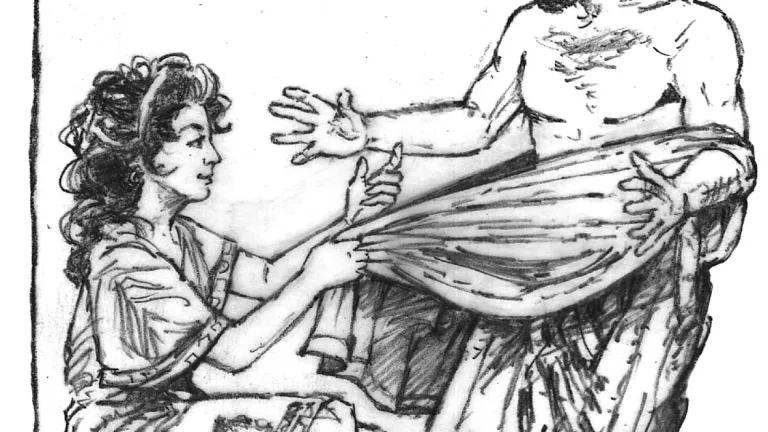How Can Parents Teach Children to Respect the Opposite Sex?

Here are three conversation starters to help parents raise their children to have healthy and respectful relationships with the opposite sex.
The Bible is a beacon of light to our sons and daughters so they can avoid taking part in sexual harassment and assault.
The Scriptures help us understand that sexual harassment and assault has existed for millennia. Consider Abram. Genesis 12:11 shows that Sarai, his wife, was beautiful. Before entering into Egypt, he told her, “Indeed I know that you are a woman of beautiful countenance. Therefore it will happen, when the Egyptians see you, that they will say, ‘This is his wife’; and they will kill me…”
Abram’s fear that he would be killed and his wife taken reveals how the society of his time viewed women as property to be taken by force if the victimizer so desired. However, the Bible records that fear of sexual abuse and harassment is not exclusively perpetrated against women.
As you read about the life of Joseph (in Genesis 39), you will find a heart-wrenching story that sounds like a modern-day news article: “Now Joseph was handsome in form and appearance. And it came to pass after these things that his master’s wife cast longing eyes on Joseph, and she said, 'Lie with me'" (Genesis 39:6-7).
Notice the phrase “it came to pass.” What does it mean?
There came a point when Potiphar’s wife began to notice Joseph in a different way. It may have been that, initially, Joseph was just one of the many slaves in the house. But one day she looked at him differently and “cast longing eyes” upon him. She began in her mind to conceive a sinful desire and to dwell upon it.
Did this woman have no apprehension or shame as she says so boldly, ‘Lie with me’? How does someone allow themselves to go so far to become so bold in their sin?
Potiphar’s wife was clearly feeding lust and giving herself over to sin through her imagination.
Feeding lust or desire in our thoughts is very dangerous because the more we dwell on those thoughts, the more likely we will act on the sin.
And so it happened to Potiphar’s wife: “So it was, as she spoke to Joseph day by day, that he did not heed her, to lie with her or to be with her. But it happened about this time, when Joseph went into the house to do his work, and none of the men of the house was inside, that she caught him by his garment, saying, 'Lie with me.' But he left his garment in her hand, and fled and ran outside” (Genesis 39:10-12). Because she had allowed these sinful thoughts to remain and to grow in her mind, she clearly became enslaved to that desire.
Although Joseph was clear about his response and fled her immediately, Potiphar’s wife then became enraged and falsely accused Joseph of sexually assaulting her, seemingly in retaliation for his rejection of her advances.
These two examples show the damage that can be caused by not having a healthy respect for the opposite sex. And this starts with young people being taught godly principles based on God’s perfect design for relationships and families.
Here are three conversation starters for teaching respect for the opposite sex to our sons and daughters.
Parents and adult role models need to have these and many other difficult conversations with our children early and regularly. Proverbs 22:6 teaches us that guidance at the early stages will make a significant impact: "Train up a child in the way he should go, and when he is old he will not depart from it.”
Ask your children these questions.
1. How do you think God feels when someone hurts or takes advantage of one of His children?
Ultimately, every person belongs to God, not to us. How we treat those people matters to God. He is watching to see how we show respect and honor to those of the opposite sex or how we dishonor them.
Genesis 2 explains that God formed man from the dust of the earth and breathed the breath of life into him. He then fashioned the woman from the man’s rib. Each is distinct and valuable and both reflect the image and likeness of God. Each and every human being born since then has the potential to one day join God’s family. Therefore, be careful that you treat others with kindness and respect. Sexual harassment or abuse can have lifelong negative effects on an individual’s emotional and spiritual well-being.
2. What are some of the examples of behaviors in shows, books, games or online that would promote sexual harassment or abuse as acceptable?
Discuss the subtle or blatant tones of disrespect commonly woven throughout much of our entertainment today. Give your own examples and be prepared to talk through what affect the scenario would have on someone in real life. Talk about how it would feel to be treated in those ways or what consequences there might be for both parties. What damage can result from hurting someone’s reputation or hurting them emotionally or spiritually?
3. Can you think of ways to show respect and kindness to those of the opposite sex?
Philippians 2:3-4 holds a wonderful principle: “Do nothing out of selfish ambition or vain conceit. Rather, in humility value others above yourselves, not looking to your own interests but each of you to the interests of the others" (New International Version).
It is easy to forget that we are each accountable before God for our behavior toward others. We should treat others with the same kindness, consideration and patience that we would want to be treated with.
As parents and caregivers, we must ask God to lead our conversations and provide wisdom in how to help our young ones navigate the increasingly vile pressures of the culture around them. As Sarai and Joseph lived in ungodly societies many centuries ago, so we live in a dark world. We must prepare our little ones to stand against it with God as their shield.





